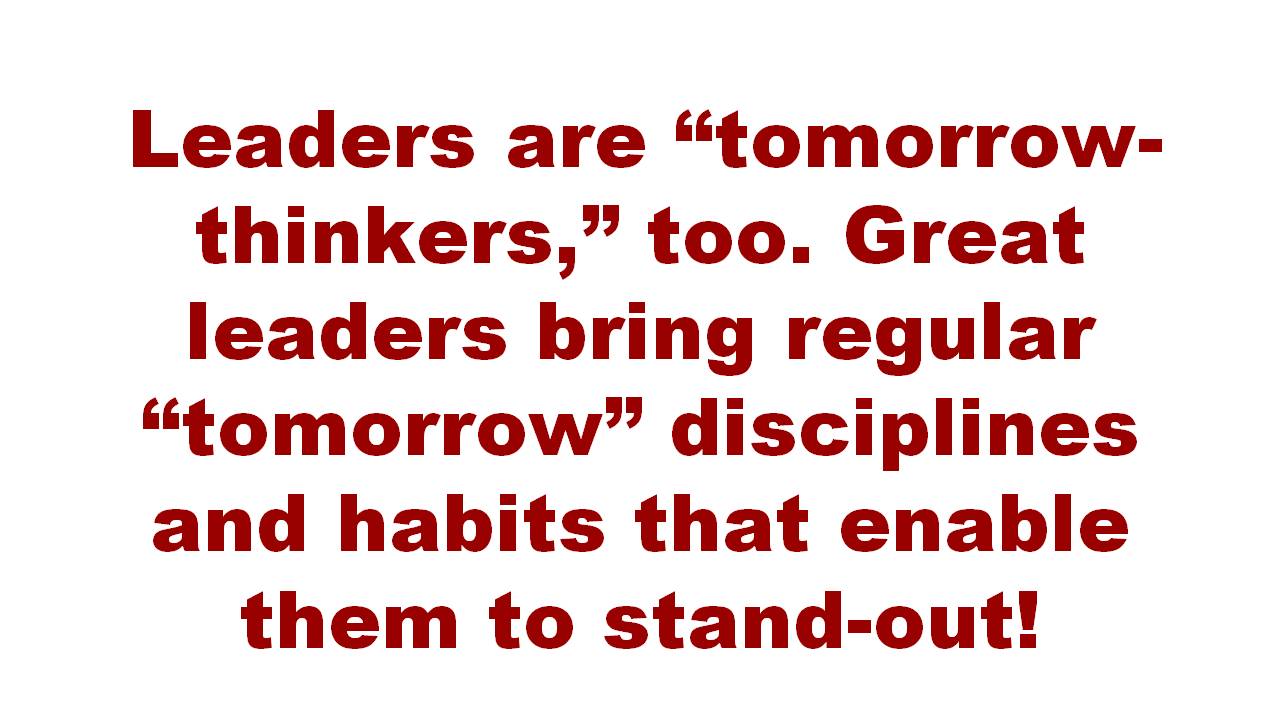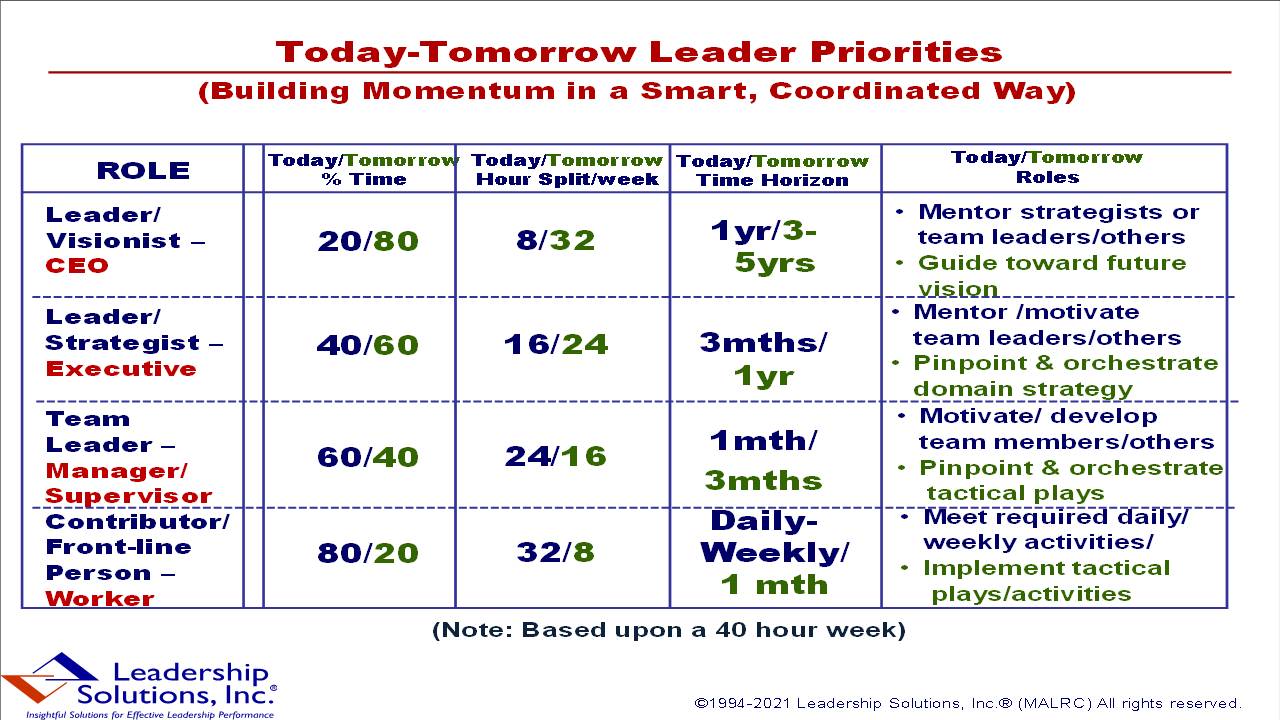by Peter A. Arthur-Smith
“Leaders are inclined to be interested in tomorrow as well as today; whereas managers are usually inclined to be almost exclusively fixated on today.”

Are you a day-to-day manager or an ahead-of-your-game leader? If you’re a smart person, then you’re likely to do better than many at handling a variety of things that come your way. But just imagine how much more effective you would be if you were well prepared for certain eventualities, even though not entirely predictable? Also, if you’re smart, you’ll probably produce operational outcomes more favorable than a lot of other conventional managers (CMs). However, even then, you will invariably fall short of outcomes achieved by enlightened leaders (ELs). Why is that?
ELs have a natural habit of always devoting a certain portion of their time to thinking about “tomorrow,” whereas CMs too often devote overly much time fixating-on and perfecting “today.” Some people are natural “tomorrow” thinkers – some crazily so like Elon Musk, which is why he often irritates those around him and drives his family crazy, too. People like him clearly have some elements of leadership, although have trouble building a strong, stable, and enlightened leader team around them. Constant turmoil is their mantra.
Turning to the right amount of “tomorrow-think:” this will be proportionate to the level of your leader role. If you are the Principal or Visionist (CEO+) of a significant venture, then you’ll need to devote around 80% of your time to “tomorrow-think;” be that projecting 1-2-3, even 5, years ahead when thinking-about your likely intentions. It also includes projecting 6-12months out, where you also need to position-prepare for intentions that are more near-at-hand. Simultaneously but discretely, you’ll devote the remaining 20% of your time to keeping an eye on immediate “today” execution by key team members and others…see below pictograph.

On the other hand, if you’re a Strategist (Executive+, where + means “tomorrow-thinker” as well as executor), as a member of your Visionist’s team; you should devote 60% of your time to “tomorrow-think”: that is, thinking-about issues as you anticipate 6-12-18 months ahead. It also includes projecting 3-6 months out, where you need think-time to position-prepare for more near-at-hand intentions. Simultaneously but discretely, you’ll devote the remaining 40% portion of your time toward direct personal involvement with implementation or monitoring on immediate “today” execution by key team members and others…see above pictograph. (Note: Think-about, position-prepare, and implementation-execution activities all run concurrently but are dealt with separately within their own specific time allocations.)
Of course, if you’re a Team Leader (Supervisor ++), you’ll devote only 40% of your time to “tomorrow-think;” that is, thinking-about issues 1-3-6 months ahead. This will include spending time thinking-through how you position-prepare for 2 week-1 month projected issues as relates to your more near-at-hand intentions. Your remaining 60% portion of Team Leader time either means direct personal involvement with or monitoring immediate “today” execution activities, as pursued by your team members as well as others. (Note: ++ alludes to “tomorrow-think” and treating their team members with utmost respect.)
By this phased, shared approach across the spectrum of Visionist-Strategist-Team Leader, you will note these three leader levels covering everything without stepping on each other’s toes. This happens all too often within our conventional management (CM) modes of operating, where executives/managers/supervisors look over each other’s shoulders with everyone focusing almost exclusively on “today.” The phased EL advantage, meanwhile, continues onward to your frontline Contributors (Employees+++), where only 20% portion of their available time is devoted to “tomorrow-think.” That’s where they think-about intentions for 2 weeks-1 month ahead and devote time to position-prepare for their forthcoming 1-2 week ahead activities. The remaining 80% of their immediate week is devoted to executing/implementing what’s required. (Note: +++ alludes to additional expectations of “contributors” – “tomorrow-think,” feeling empowered, and being fully briefed.)
You can now discern from this specific shared, inter-locking approach that ELs become leader-disciplined enough to devote sufficient think-time, relative to the complexity of their role, to contemplate issues and strategies ahead of time. It helps if they also conjoin this with the following disciplines/practices:
- Visionists & Strategists – They invoke the practice of Periscope Time (PT). It’s where they set aside a morning or whole day every six weeks – or quarter – to raise their strategic periscopes and scan future opportunity horizons; that is, Think-about and/or Position/Prepare fir forthcoming possibilities. Done as a team helps a lot, since it aids “buy-in.”They should take a long-weekend immediately prior to PT to unwind and clear their minds for thinking.
- Strategists &Team Leaders – Team leaders will take a shorter, more operational form of Periscope Time every month, in conjunction with their respective Strategists where appropriate, to think-about and position/prepare for leading their teams forward.
- Contributors – Should pursue up-to hour-long Periscope Time sessions on a weekly basis, in conjunction with their Team Leaders where appropriate, to prioritize their time between “What’s vital,” “What’s important,” and “What’s nice to do.”
(Note: Leaders at every level should become visible practitioners of Periscope Time and find imaginative ways to stimulate team members to practice PT until it becomes habit forming. Vital habits form through successful practices. It usually takes at least 21 consecutive nudges/sessions before something becomes a habit – check out your own success by this yardstick.)
Some people may never develop the habit of thinking-about or positioning-preparing for “tomorrow.” It’s just not in their DNA. In that case; they are unlikely to prove to be promising leaders. They should be allowed to contribute as daily operators, instead. At home they will hopefully align themselves with a “tomorrow-thinking” partner. Who said unlikes aren’t attracted to each other, while likes often repel each other?
